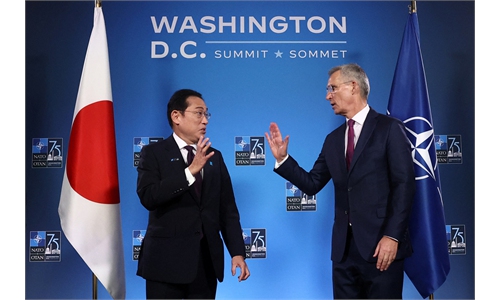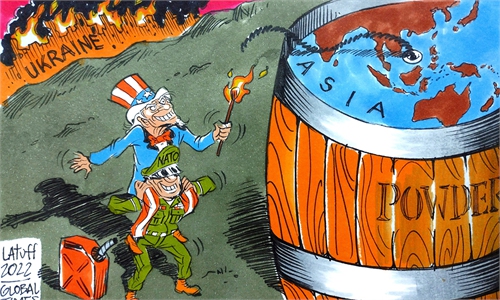
Illustration:Liu Rui/GT
On the sidelines of the recent NATO summit in Washington, the Biden administration announced that beginning in 2026, the US is to position new weapons in Germany capable of hitting targets within 2,700 kilometers.
While still in Washington, the German chancellor agreed to this future deployment in a joint statement. Yet no prior discussion about these new US rockets and cruise missiles was held in the Bundestag or in the Committee on Foreign Affairs, nor was there any debate on the topic in the wider German public sphere.
This development ought to be highly controversial, especially as the missile systems in question are equipped to reach targets deep inside Russia - the linear distance between Berlin and Moscow is a mere 1,600 kilometers. Russia has declared its intention to respond accordingly.
The US' purported deterrent in fact poses a massive threat to the security of Germany's population. The US treats our country as if it is nothing but an aircraft carrier. The subservience with which the federal government accepts and waves through decisions by the US is actually frightening. When he was sworn into office, the chancellor committed himself to protecting the German people from harm. But by allowing the US to place its missiles in Germany, his willingness to uphold this obligation has been thrown into doubt.
The planned long-range missile deployment is just one example of a series of decisions the US has made in an attempt to push Germany onto the frontline of its conflict with Russia. Other examples include the US putting pressure on Berlin to ship its Leopard tanks to Ukraine, which factored in a predictable, and brutal, Russian reaction. In the meantime, the NATO mission in Ukraine has established its headquarters in the German city of Wiesbaden, near the banking centre of Frankfurt am Main. Stationing long-range missiles in Germany under US command - the attendant infrastructure will likely be partly financed by German tax payers - only inflames the situation further.
The aim is clear, to bring Germany closer to a direct military confrontation with Russia, or at least to force Berlin to spend a greater share of its resources on the proxy war with Moscow. Washington appears to have calculated that if Germany keeps Russia busy in Europe, the bulk of its own military capacity can be shifted over to its efforts to contain China in East Asia and the Indo Pacific.
It must be stressed that the current decision to station US missiles in Germany was only made possible by the US' unilateral withdrawal from the Intermediate Range Nuclear Forces Treaty (INF) under US President Trump in 2019 (the US alleged that Russia had breached the terms of the treaty).
Since 1987, the INF had barred the manufacture and deployment of all ground-launched intermediate-range missiles capable of hitting targets in a range of 500 to 5,500 kilometers.
The question must be raised: Is the current US deployment of missiles in Germany one component of a long-planned strategy of escalation, responsible for both Washington's withdrawal from the INF and NATO's eastward expansion? This interpretation would be consistent with the fact that the US had evidently already begun developing new intermediate-range missiles prior to the termination of the INF. As early as 2017, an initial Multi-Domain Task Force (MDTF) was established in Wiesbaden, allegedly for test purposes only. The 2021 reactivation of the 56th US Artillery Command may also be considered a preparatory step toward escalation. During the Cold War, this Command was responsible for US Pershing missiles; now it will oversee the new US long-range deployments.
The US' plans today are not identical to its previous Cold War strategy. However, the shorter warning period entailed by new hypersonic missiles, for example, means that contemporary US deployments are distinct from the intermediate-range missiles stationed in Germany in the earlier era. Not surprising, Russia perceives the new weapons systems as a significant threat - "a knife to the throat". The speed of the new hypersonic missiles in particular creates a far more dangerous situation than what prevailed during the Cold War, including potentially greater risk of irreversible consequences due to false alarms. As such, US long-range missile deployments increase the risk of nuclear war enormously, amid a new nuclear arms race that is already underway.
The central problem facing all NATO allies - those formal members of the alliance and those included through bilateral agreements - is this: As with the dependent kingdoms on the eastern border of the Roman Empire two millennia ago, allies must forfeit their sovereignty and subordinate their foreign policy to the security interests of the hegemon. All the while, an illusion is to be maintained that their sovereign interests are indeed served by such an arrangement with the US, if only as a collateral benefit. But this wishful thinking is increasingly difficult to sustain.
Instead of cultivating diplomacy, the US' NATO allies have followed Washington's example, and attempted to dictate to other countries what is and what is not permissible. Given the rapid economic rise of the BRICS states, such a neocolonial approach, however, appears to be doomed.
In Germany, the focus must now turn to mobilising society against the stationing of US missiles within its borders. Since this decision calls into question the very security of the German population, a referendum must be held urgently to determine whether the polity accepts it. Even more pressing is finding an answer to the general question of how peace and democratic sovereignty may be defended in today's Germany, given the US' evident willingness to put its own allies at such grave risk.
The author is foreign policy spokesperson for the "Sahra Wagenknecht Alliance" (BSW) grouping in the German Bundestag, and is the BSW grouping coordinator on the Committee on Foreign Affairs. opinion@globaltimes.com.cn



